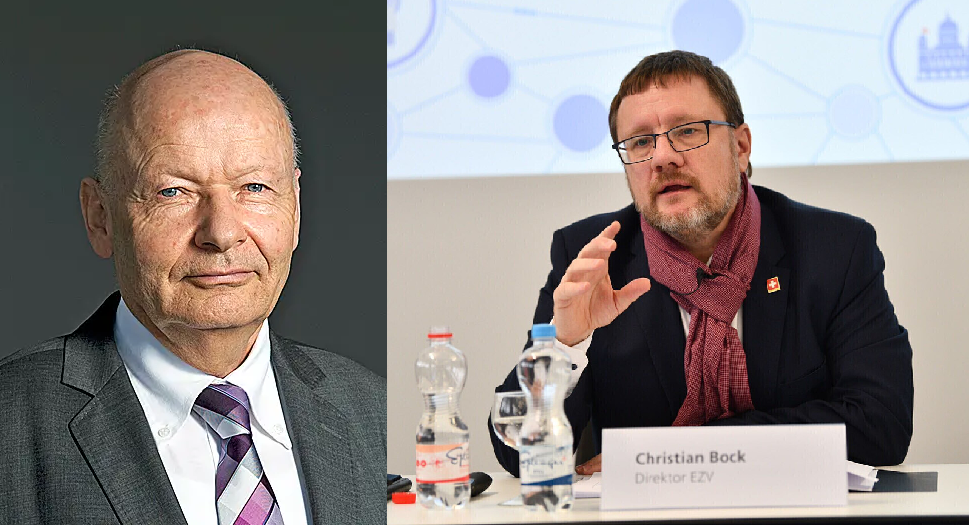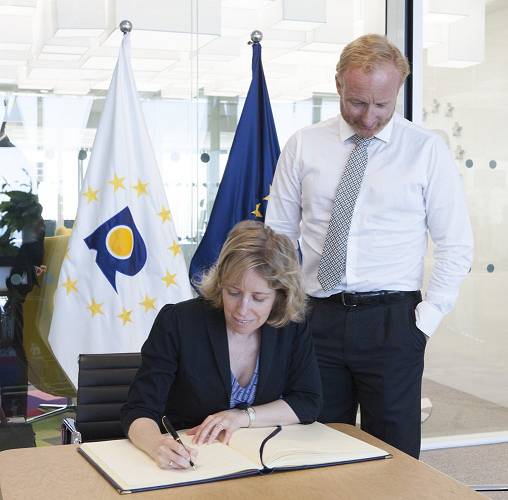

The Swiss delegation: Roland Grossenbacher and his deputy Christian Bock.
With hindsight, following the recent ILOAT Judgments delivered on 7 July 2021, it's clear to everybody that the "Strike Regulations" adopted by the EPO's Administrative Council in June 2013 had more holes than the proverbial Swiss cheese.
"But that didn't stop the delegation representing Switzerland from endorsing Battistelli's liberticidal project back in June 2013."The actions of the Swiss delegation are not that surprising when it is recalled that the head of delegation was Roland Grossenbacher, long-standing director of the Swiss Federal Institute for Intellectual Property (Institut für Geistiges Eigentum - IGE) since 1989.
In an article published in the Swiss daily Neue Züricher Zeitung around the time of his retirement in 2015, Grossenbacher was portrayed [PDF] as "the positive technocrat" who had "contributed a great deal to a more efficient administration".
Amongst other things, the article explains how Grossenbacher led the "transformation" of the IGE in 1996.
"Like Friedrich Rödler, his Austrian counterpart on the EPO's Administrative Council, Grossenbacher was a relentless advocate of "more efficient administration" at the EPO and he showed just as much hostility and animosity towards the organisation's staff."This "transformation" was a Thatcherite-style restructuring of the Institute based on New Public Management principles. The result was the establishment of an autonomous "executive agency" - similar to the UKIPO - having control of its own budget and the introduction of a new personnel statute, according to which employees were "no longer subject to the civil service statute".
The Institute is independent of the federal budget and derives its working funds from fees, set by the Institute based on market conditions, and approved by the Swiss Federal Council. According to the enabling statute, the Institute is to be managed "in accordance with the principles of business administration."
Like Friedrich Rödler, his Austrian counterpart on the EPO's Administrative Council, Grossenbacher was a relentless advocate of "more efficient administration" at the EPO and he showed just as much hostility and animosity towards the organisation's staff.
"In his later years, he appears to have been one of those "alpha males" that caused headaches for Alison Brimelow."However, in contrast to Rödler, Grossenbacher was quite high up in the pecking order of the EPO's Administrative Council and managed to become a very influential figure in the governance of the organisation. In his later years, he appears to have been one of those "alpha males" that caused headaches for Alison Brimelow.
Between March 2000 and March 2009, Grossenbacher served as chairman of the Administrative Council for three consecutive three-year terms. When he stepped down in March 2009, he was made "Honorary Chairman" of the Council by his successor Battistelli. [PDF]
 This supposedly gave him permission to continue to sit in on meetings of the secretive Board of the Council - the so-called "Board 28" - which prepares the agenda for the Council's quarterly sessions in "close cooperation" with the EPO President.
This supposedly gave him permission to continue to sit in on meetings of the secretive Board of the Council - the so-called "Board 28" - which prepares the agenda for the Council's quarterly sessions in "close cooperation" with the EPO President.
After stepping down as Council Chairman, Grossenbacher proceeded to throw his hat into the ring as one of the four candidates (warning: epo.org link) for the position of EPO President. At one point in November 2009 it even looked as if he might overtake Battistelli. [PDF]
In the end, the Machiavellian Frenchman managed to outmanoeuvre his Swiss rival.
"As a matter of fact, Grossenbacher enthusiastically supported most of Battistelli's EPO "reforms" until they fell out with each other some time in 2016."But, in contrast to the notoriously choleric Battistelli, Grossenbacher was a "good loser" and the pair still remained close allies and collaborators.
As a matter of fact, Grossenbacher enthusiastically supported most of Battistelli's EPO "reforms" until they fell out with each other some time in 2016.
According to EPO insiders, this falling out was initially triggered by Grossenbacher's support for a resolution adopted by the Council in March 2016 requesting Battistelli to address various issues that had been the source of deep conflicts at the EPO.
The dispute between Battistelli and Grossenbacher escalated during the Council's subsequent discussions about the reform of the Boards of Appeal.
Battistelli was incensed by what he perceived as Grossenbacher's "betrayal". He is reported to have thrown a tantrum and ordered the removal of Grossenbacher's portrait from the gallery of former Council Chairmen which adorns the corridors of the Isar building beside the Council's assembly chamber.
"Battistelli was incensed by what he perceived as Grossenbacher's "betrayal". He is reported to have thrown a tantrum and ordered the removal of Grossenbacher's portrait from the gallery of former Council Chairmen which adorns the corridors of the Isar building beside the Council's assembly chamber."Back in June 2013 the alpha-male "bromance" between Roland and Benoît was still in full swing. At that time it was inconceivable that Grossenbacher would have raised an objection to any of the "reforms" being proposed by Team Battistelli, including the controversial "Strike Regulations".
As a matter of fact, a publication of the EPO staff union (SUEPO) dating from 2007 reveals that Grossenbacher's concerns about the risk of strikes at the EPO long predated Battistelli's "reforms" in 2013.
To appreciate the source of these concerns, it needs to be understood that – in common with all other national IPOs of the EPO's member states - a significant amount of the income of the Swiss IGE comes from renewal fees on patents that have been granted by the EPO.
Thus any kind of industrial action which affects "output" at the EPO also entails the risk of adverse financial consequences for national IPOs due to a reduction in their renewal fee income from EPO-granted patents.
"It's very clear from this that Grossenbacher would have been an enthusiastic supporter of any measures designed to reduce - or even eliminate - the risk of strikes at the EPO."The annual report of the Swiss IGE for 2006/2007 put a figure of CHF 5.6 million on the financial risk of strikes at the EPO over a two-year period (equivalent to approx. € 5.2 million at current exchange rates).
Although the annual report of the Swiss IGE can no longer be found online, the SUEPO document analysing [PDF] its contents and their implications for EPO governance is still accessible.
It's very clear from this that Grossenbacher would have been an enthusiastic supporter of any measures designed to reduce - or even eliminate - the risk of strikes at the EPO.
The legality - or otherwise - of the measures proposed by Team Battistelli appears to have been of secondary importance to him - assuming that he even bothered to give it a moment's thought.

Campinos eyes up Grossenbacher's successor, Catherine Chammartin during a photo-op session.
"As we shall see, Bock's attempts to apply management methods "à la sauce Battistelli" to the "transformation" and "modernisation" of the Federal Customs Administration are currently generating a huge amount of public controversy in Switzerland."However, Battistelli's "Honorary Chairman" kept lurking in the background for another four years as an "advisor" to the Swiss delegation until he was finally put out to grass for good in December 2019.
In the next part we will take a look at Grossenbacher's deputy back in 2013, a gentleman by the name of Christian Bock, who went on to become the head of the Swiss Federal Customs Administration.
As we shall see, Bock's attempts to apply management methods "à la sauce Battistelli" to the "transformation" and "modernisation" of the Federal Customs Administration are currently generating a huge amount of public controversy in Switzerland. ⬆